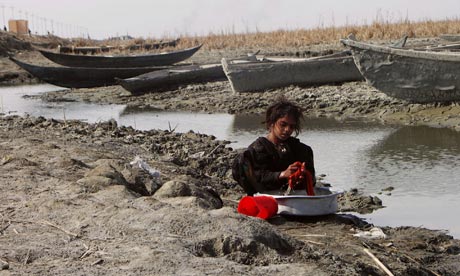Water shortage threatens two million people in southern Iraq
Electricity supply to Nasiriyah drops by 50% as Euphrates river dries up
By Martin Chulov in Nasiriyah, Iraq
A water shortage described as the most critical since the earliest days of Iraq’s civilisation is threatening to leave up to 2 million people in the south of the country without electricity and almost as many without drinking water.
An already meagre supply of electricity to Iraq’s fourth-largest city of Nasiriyah has fallen by 50% during the last three weeks because of the rapidly falling levels of the Euphrates river, which has only two of four power-generating turbines left working.
If, as predicted, the river falls by a further 20cm during the next fortnight, engineers say the remaining two turbines will also close down, forcing a total blackout in the city.
Down river, where the Euphrates spills out into the Shatt al-Arab waterway at the north-eastern corner of the Persian Gulf, the lack of fresh water has raised salinity levels so high that two towns, of about 3,000 people, on the northern edge of Basra have this week evacuated. “We can no longer drink this water,” said one local woman from the village of al-Fal. “Our animals are all dead and many people here are diseased.”
Iraqi officials have been attempting to grapple with the magnitude of the crisis for months, which, like much else in this fractured society, has many causes, both man-made and natural. Two winters of significantly lower than normal rainfalls – half the annual average last year and one-third the year before – have followed six years of crippling instability, in which industry barely functioned and agriculture struggled to meet half of subsistence needs.
“For thousands of years Iraq’s agricultural lands were rich with planted wheat, rice and barley,” said Salah Aziz, director of planning in Iraq’s agricultural ministry, adding that land was “100% in use”.
“This year less than 50% of the land is in use and most of the yields are marginal. This year we cannot begin to cover even 40% of Iraq’s fruit and vegetable demand.” …
Water shortage threatens two million people in southern Iraq
